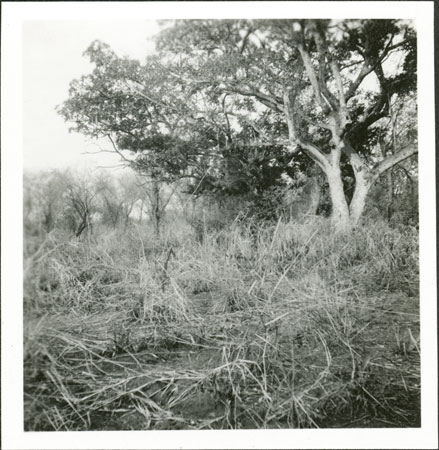Anuak sacred tree burial

60 x 60 mm | Print gelatin silver
There are records relating to alternative images that we do not have scans for in the database:
1998.342.30.1 - Negative film nitrate , (60 x 60 mm)
1998.342.30.1 - Negative film nitrate , (60 x 60 mm)
Date of Print:
Unknown
Previous PRM Number:
EP.AK.30
Previous Other Number:
4 (40)
Accession Number:
1998.342.30.2
Description:
A large and sacred Tamarind tree (with a ?Sycamore in front of it), located to the west of Pochala near some falls on the Akobo river.
This sacred tree was known as "Aboori" after a woman who was buried (wrapped in mats and thornwood) in its branches.
Photographer:
Edward Evan Evans-Pritchard
Date of Photo:
1935 March - May
Region:
[Southern Sudan] Jonglei Pochala
Group:
Anuak
NamedPerson:
Aboori
PRM Source:
Edward Evan Evans-Pritchard
Acquired:
Donated 1966
Other Owners:
E. E. Evans-Pritchard Collection
Class:
Death , Plant Use , Vegetation
Keyword:
Grave
Primary Documentation:
PRM Accession Records - Accession Book Entry [p.
98] 1966.27 [1 - 24] G[ift] PROFESSOR E.
E.
EVANS-PRITCHARD; INST.
OF SOCIAL ANTHROPOLOGY, 51 BANBURY RD.
OXFORD - 1966.27.19 - S.
SUDAN, DARFUNG.
VARIOUS TRIBES.
Box of negatives in envelopes, [1 - 242] & 1966.27.20 - Box of prints of these negatives [refers to object 1966.27.19] [1 - 242], in envelopes.
Notes on print/mount - "4 40 Tree Burial"
Notes on print/mount - "4 40 Tree Burial"
Other Information:
In The Political System of the Anuak of the Anglo-Egyptian Sudan (monographs on Social Anthropology no.4, London School of Economics, 1940) page 73, E.
E.
Evans-Pritchard notes that 'Conspicuous trees in villages are often sacred...
There is a magnificent sacred tamarind to the west of Pocala, opposite the shallows where the Akobo falls over limestone rocks.
It is called "Aboori" after the name of a woman who was entombed in its branches...
I was told that if anyone is buried at the foot of, or in the branches of, a sacred tree it takes his name.
People sometimes salute a tree in which a person has been entombed with a present as they pass by.
If a dying man demands it, he is entombed in the branches of a tree in the forest in order that his ghost may be quickly avenged on the man responsible for his death.
The corpse is wrapped in mats and laid in the branches and covered with thornwood to prevent beasts and birds of prey from disurbing it.' [Chris Morton 16/12/2003]
Recorder:
Christopher Morton 16/12/2003 [Southern Sudan Project]

